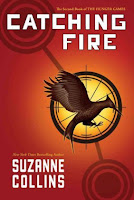What an intense, powerful book. After the crazy escape/rescue from the Quarter Quell, Katniss finds herself recovering in the fabled District 13, where they want her to be their "mockingjay", their symbol of revolution. Katniss finally agrees, but then discovers that they want to dress her up and make her look good so they can use her for propaganda videos: which seems not all that different from the way the Capitol used her. But Katniss isn't an actress, and she sounds terrible saying the words they want to put in her mouth-- so finally Haymitch has the brilliant idea to send Katniss out to do things, visit the districts that have rebelled, and just film her doing what comes naturally to her. This works out pretty well, but as the rebellion goes on and more and more districts break free from the hold of the Capitol, Katniss sees more of the war and more of District 13, and begins to wonder who she can trust, and whether or not the new regime would be that different than the old one.
District 13 is a tough place for Katniss to live-- very regimented and orderly, scheduled and efficient, living underground and away from nature most of the time. With their limited resources and a bombed district above-ground, they have had to live like that to survive, and they've done fairly well, although it is hard for Katniss to come to terms with the idea that District 13 had a cease-fire with the Capitol while the other districts suffered-- they agreed to be left alone in exchange for letting the Capitol make the other districts think that 13 had been completely destroyed.
War changes people, and we see that in many characters in this book, just as having to fight in the Hunger Games changed Katniss and Peeta. One of the most heartbreaking story-lines in this book is what happens to Peeta-- he and a few others were left behind when Katniss was rescued, and Katniss sees him on TV as a mouth-piece for the Capitol-- first well-fed and healthy, but then more and more gaunt, confused, and unhealthy. Finally they are able to rescue Peeta and Johanna, but they have been tortured, and sweet, gentle Peeta has been brain-washed into something cold and hateful. Another character who we see changed by war is Gale-- he turns his cleverness in fashioning traps for hunting animals towards bombs and other mechanisms of war; from the first book in the trilogy there were hints about his anger at the Capitol, but we see that hardness come out in his actions in this book. Towards the end, the parallels between war and the Hunger Games are made explicit when Katniss, Finnick, and the rest of their team must work their way through the Capitol, which has been laced with mines and traps, just like the arena in the Games.
There are hints occasionally throughout the book that the leadership of District 13 may be no better than the Capitol-- in fact, I wondered if the name of President Coin was a hint towards that; she is just another side of the coin of the evil and manipulative President Snow. There is a chilling moment late in the book when a question is posed that makes the human capacity for evil explicit, when a new round of Hunger Games is suggested as a possible solution to deal with the horror and death of the war.
The world Collins has created in this trilogy is so rich and full and believable (if horrible in some ways). The mockingjay of the title is one of those wonderful details that has been present since the first book, when Madge pins a gold pin onto Katniss' dress before she leaves on the train to go to the games. The mockingjay becomes an apt symbol of the revolution because it is a cross between the mockingbird and the jabberjay that the Capitol engineered as a bird-spy, which the rebels figured out and turned against them-- and the mockingjay is a reminder and a sign of that technology living on in another form, in a way that the scientists of the Capitol could never predict or control. In this book we also get the explanation for the source of the name of the country of Panem-- it's taken from the Latin panem et circenses, bread and circuses, which refers to appeasing the populace with food and spectacle, drawing a parallel between the Colosseum of Rome and the Hunger Games of Panem.
As the book ends, we get a glimpse of Peeta, Katniss, and Haymitch, and their life after the turmoil of the events of the book. I was glad to read some small part of their story, and what they did to mourn and remember the things they went through and the people that they lost, and to think of them wrestling with how to tell their story, the awful things they did, to the next generation. Afterwards, it struck me that the people who were victors in the Hunger Games and instrumental in winning the war ended up pretty far-removed from the actual running of the government after the fact; and I can't help but think, perhaps this is because the kind of people who can win these deadly games (war or otherwise) aren't the ones you want holding the pieces after.
| Title: | Mockingjay |
|---|---|
| Author: | Suzanne Collins |
| Date published: | 2010 |
| Genre: | Young Adult / Science Fiction |
| Series: | The Hunger Games Trilogy |
| Number of pages: | 390 |
| Notes: | borrowed from Catey |



